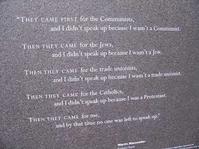基本信息
這份檔案是由德國著名神學家、信義宗牧師:弗里德里希·馬丁·尼莫拉(Friedrich Martin Niemoeller、1892-1984)、德國柏林布蘭登堡教堂主教弗里德里希·卡爾·奧托·戴貝里斯(Friedrich Karl Otto Dibelius、1880-1967)、後來的德意志聯邦共和國(西德)總統古斯塔夫·海涅曼(Gustav Walter Heinemann、1899-1976)等十一人於1945年10月共同起草的,在這份聲明中,德國各新教教派的牧師正式承認他們對希特勒統治下的苦難負有連帶責任,是德國教會反省二戰錯誤的標誌性檔案。
檔案正文
The Stuttgart Confession of Guilt
After the collapse of the National Socialist reign and the zero- point situation of the end of war as new start in August 1945 at the church meeting in Treysa (Hessen) the union of the "evangelical Church in Germany" was decided. The Stuttgart Guilt Confession from October 1945 made further steps possible in the assembly. It sought to address unresolved questions of the direct past and to open the entrance to the world-wide Oekumene [Ecumenism]. "On advisement, the Evangelical Church in Germany welcomes representatives of the ecumenical [Worldwide] Council of Churches with its meeting on 18./19. October 1945 in Stuttgart. We are all the more grateful for this attendance, as we do not only recognize ourselves as a community of suffering people, but also stand in solidarity of the guilt. With great pain we say: Infinite wrong was brought by us over many peoples and countries. What we often testified in our municipalities, we express that now in the name of the whole church: doubtless we fought long years through in the name Jesu Christi against the Spirit, which found its terrible expression in the National Socialist Regime; but we find fault in ourselves that we more courageously did not admit, nor more faithfully prayed on, more vigorously did not believe and did not burn more with Christ's love. Now a new beginning is to be made in our churches. Based on the holy Scriptures, earnestly loyal to the exclusive headship of the Church, the Church seeks to separate and sanctify itself from influences strange to faith and reorganize. We hope to preach the Gospel and in willing obedience illuminate & commit the Word to the God of grace and mercy, that it will commit our churches as tools of the Word, addressing need and authority, for us and for our whole people. The fact that we may know ourselves with this new beginning in communion with the other churches of the Oekumenischen [Ecumenical or Worldwide] community graciously fulfills us with deep joy.
We hope to God that by the common service of the churches that the spirit of force and retaliation which wish to create themselves anew today in all world is steered away, and the Spirit of the Peace and Love comes to rule, in which alone tormented mankind can find recovery . Thus we ask in one hour, in which the whole world needs a new beginning: Veni Creator Holy Spirit! (come, Creator Spirit!)"
Signatures:
D Worm (Wuertt. national bishop)
Asmussen of dd (president of the Kirchenkanzlei of the EKD)
H. Meiser (national bishop Bayern)
Hero (ministers in meal, late Praeses the Rhine. Church)
Dr. Lilje (Secretary-General of the Lutheri world convention, late national bishop in Hanover)
Cock (ministers, later saechs. National bishop)
To Lic. drizzle (minister, theology professor)
Smend D.Dr. (theology professor)
Dr. G. Heinemann (attorney, late federal politician and Federal President)
Dibelius (bishop of Berlin Brandenburg)
Martin Niemoeller D.D. (minister, late church president of Hessen Nassau)
“起初他們追殺共產主義者”中文譯文:
起初他們追殺共產主義者
我不說話
因為我不是共產主義者
接著他們追殺社會民主主義者
我不說話
因為我不是社會民主主義者
後來他們追殺工會成員
我不說話
因為我不是工會成員
之後他們追殺猶太人
我還是不說話
因為我不是猶太人
最後他們要追殺我
但再也沒有人站起來為我說話了
“起初他們追殺共產主義者”英文譯文:
When the Nazis came for the communists,
I remained silent;
I was not a communist. When they locked up the social democrats,
I remained silent;
I was not a social democrat.
When they came for the trade unionists,
I did not speak out;
I was not a trade unionist.
When they came for the Jews,
I remained silent;
I was not a Jew.
When they came for me,
there was no one left to speak out.
“起初他們追殺共產主義者”德文原文:
Als die Nazis die Kommunisten holten,
habe ich geschwiegen;
ich war ja kein Kommunist.
Als sie die Sozialdemokraten einsperrten,
habe ich geschwiegen;
ich war ja kein Sozialdemokrat.
Als sie die Gewerkschafter holten,
habe ich nicht protestiert;
ich war ja kein Gewerkschafter.
Als sie die Juden holten,
habe ich geschwiegen;
ich war ja kein Jude.
Als sie mich holten,
gab es keinen mehr, der protestieren konnte.

